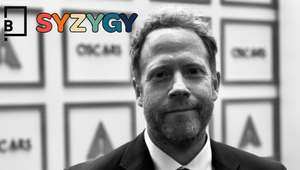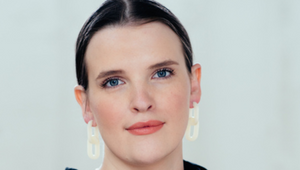
“This Is the Soapbox Issue”: Kelly Bayett on the Real Cost of Free Treatments

'Money Talks' is an interview series, created in partnership between Little Black Book and SYZYGY, that is set to bust taboos by shining a light on the role of finance in production.
We’ll be speaking to leading producers and production company owners about the financial pressures they face day-to-day, and what challenges they need to overcome in order to simply make top-tier productions happen. Over the course of these conversations, we’ll hear first-hand stories from the production frontline and get a little more comfortable talking about that most important of topics: money.
Part three is with Kelly Bayett, managing partner at Love Song. Kelly is also the co-founder of music company Barking Owl, an experience that has informed her approach to how she feels commercial production should be paid for.
NB: Hit the links to check out parts one and two, with PRETTYBIRD’s Ali Brown and Knucklehead’s Tim Katz, World War Seven's Kat Garelli, and hungryman’s Caleb Dewart.
LBB> Something we often hear is that timely payments can be a tricky factor in production. There's a contradiction between the need to obey contract dates when it comes to the shoot but the terms of payment seem a bit more 'flexible'. What are your thoughts on this?
Kelly> This is present in every part of a project – from production to post – so it seems pretty standard at this point that you will get it when you get it. While it’s not ideal, I don’t stress on this. This is not the soapbox issue for me.
LBB> There's also the cost that goes into bids and treatments, which can impact companies of all sizes. Is this still an issue, do you feel, and what is the current status of this part of the production process? Can it ever be changed/adapted?
Kelly> This is the soapbox issue for me. I come from music and we always got a demo fee. It’s a pretty standard rate, and you would get that any time you pitch on a job. It’s normal. Nobody flinches.
When I started in production three long years ago, I immediately questioned why we would not get paid for treatments. We have to have an entire team to put them together; people are expecting books with every possible reference so nothing is left to the imagination. We have to bid multiple countries because no one shoots here anymore, though you always bid here for comparison, as asked. We always have to bid talent which we are not even responsible for. Treatment and bidding could cost $15,000 or more, and we are in a triple bid system, so that means all three of us have that expense. I have even been surprised about a fourth bidder in the mix, so now instead of a 33% chance, we have a 25% chance. It’s not right; there needs to be more transparency in the process like there is in the UK. We had a job award at bid number 26. TWENTY SIX. Every day the bidding process extends, you pay for a bidder.
Sometimes we are given a broad concept and we are expected to write the scripts, even in a triple bid scenario. The funny thing is that you will do a Zoom where you are staring back at multiple copywriters getting paid a day rate for us to do the work for free.
"Our intention is to implement a $5,000 pitch fee on most triple bids for our US jobs. We’ve looked at how much we spend on pitch fees and it's insane."
LBB> Is there anything that can be done about this, do you feel? It’s such a long-standing, prevalent problem.
Kelly> I’ve asked other production companies how they feel about charging a small fee for treatments and everyone wants to do it, as treatment costs have blown up for us all, but everyone is scared to do it. We can’t move in fear. Does the treatment fee cover the entire cost of the treatment? No. Not even close. But it helps and it makes clients and agencies accountable for the pitch as well. When you pay for it, it has more value to you.
Our intention is to implement a $5,000 pitch fee on most triple bids for our US jobs. We’ve looked at how much we spend on pitch fees and it's insane. We are a company of four people in the US. How are we supposed to absorb that kind of money for each job? We simply cannot. Our pitch fee would get absorbed into the overall budget if we win. I’ve seen a section on bid specs asking to mark if it’s a paid treatment or not and how much it is, so maybe no one is talking, but someone is getting it.
The pitch fee does not create ownership in the treatment or ideas. Just as it does in the music world, it is a small fee that brings the ideas to the table. If you like the ideas, you still have to pay for them. We also copyright our treatments, as our work is stolen often. But that is a story for another day.
LBB> Talk to me about 'markup' and how it impacts the financial health of a production company. Is there truth in that or more of a myth?
Kelly> Markup is the only way we make money. The budgets are so small, you are expected to do four days’ worth of shooting in two days, and your markup pads a bit of that since there isn’t any pad in the actual lines of the bid. I heard back in the day it was different, but today I see at least some of our markup go into the job all the time, so when they want to cut the markup, they need to understand that it just makes us less flexible. It’s why we don’t like to cut it.
Cost consultants are another piece of the puzzle we’re always working to navigate. Some are fantastic – they’ve been in the trenches of production for years and truly understand what it takes to make a project successful. Others, however, don't have the same depth of experience and make determinations based on assumptions rather than a full understanding of the creative and logistical challenges.
We even had one of them approach my EP on a job and ask, “Are you stealing from me?” Umm, no, girl. We are just trying to get this insane ask, without locked creative, that is shooting in two days – finished.
LBB> PSAs can be great opportunities to be more creative and flexible in approach, and they can also gain great traction. But, they're often done for free! How do you feel about that tension?
Kelly> A couple of things with PSAs.
First, you have to absolutely believe in the cause.
Second, you have to have a partnership with the agency/client so that you can be sure the best creative is coming out of it. It’s not only for free, but you are usually investing, so you all have to be really passionate about it. And it needs to be a place that allows the freedom of expression and ideas, so it's important for everyone to be aligned. The Harris Project was a great example of how incredible that partnership can be. Havas, Love Song, and the foundation were all aligned, working together to make something wonderful and meaningful. I don’t mind investing in that case and I never feel tension about it because we know what we are walking into.
If you aren’t passionate about the foundation or cause, don’t do it. It will never be worth it.
LBB> When it comes to budgeting a production, what’s the most surprising thing that you need to account for?
Kelly> The Presidents of the United States. With the administration being so volatile, we swing $30,000 to $40,000 a week in exchange rates. Currency can change a few pennies either way and on these bigger budgets, it makes a huge difference. It’s been a 2025 surprise!
LBB> Broadly speaking, how healthy do you think the financial landscape of the industry is right now?
Kelly> That’s a tricky question. The big agencies are doing quite well, I think. They charge per person on each project and there are so many of them. We have had 30 people on set on travel jobs! The bigger agencies themselves are billion-dollar companies. Can’t be too bad.
Production companies are feeling the squeeze of unnecessary reductions. Creatives write scripts that are amazing, but then the jobs come to us underfunded because the clients have given a budget that no one considered when writing the job and selling a very excited client on the scripts. It’s up to us to solve it and we are often vilified if we can’t make it work.
Some production companies are making a point of underbidding jobs to get them, but then you hit the ground with overages and a spot that is less than it could be if it was properly funded because you are always trying to catch up instead of planning properly from the beginning.
We have lost a number of jobs from planning properly in the beginning and being looked at as too expensive. Which is a bummer, because in the end, they end up spending the same amount of money for something that looks cheap. And sad. And cringe.
LBB> For any production business-owners reading this interview, what’s the best piece of advice you’ve either been given or had to learn first-hand?
Kelly> I have learned first-hand that we need to look out for each other and not be afraid to talk or support each other. The industry will be better and stronger when we do that. Take a stand for what you believe in and while you want to be treated fairly, don’t turn around and treat the agencies and clients unfairly. To make great work, we all have to be aligned. It is never us versus them. It’s always challenging, but it doesn’t have to be so hard.
My favourite piece of advice I have been given is from my EP, Deannie O’Neil. She always says, “Don’t say anything you don’t feel comfortable ending with ‘your honour’.”
"Our work together should always feel like a partnership. That’s when it’s fun and the best work gets made."
LBB> Finally, how do you ensure that you have enough available money for developing talent within your company, and funding passion projects such as short films and music videos?
Kelly> We are a company founded on the principle of developing talent. I always say we are a ‘pay-it-forward’ company. We offer mentorship, and we have seen our directors grow and establish themselves in the industry, and then turn around and mentor others. It’s pretty magical, actually. It’s in our DNA. Even when we don’t have the money for the passion project, we do our best to figure it out if we like the idea or at least support the project by pulling any favour we have with anyone.
LBB> Any parting thoughts?
Kelly> Our work together should always feel like a partnership. That’s when it’s fun and the best work gets made. Great work doesn’t fade away, it challenges everyone involved, including your agency and clients. Does it scare you a little bit? That’s a good thing! Make sure you have the budget and time for the big creative ideas, don’t have the creative execution that would ‘only be better if…’
To see more from LBB and Syzygy's Money Talks series, click here.












